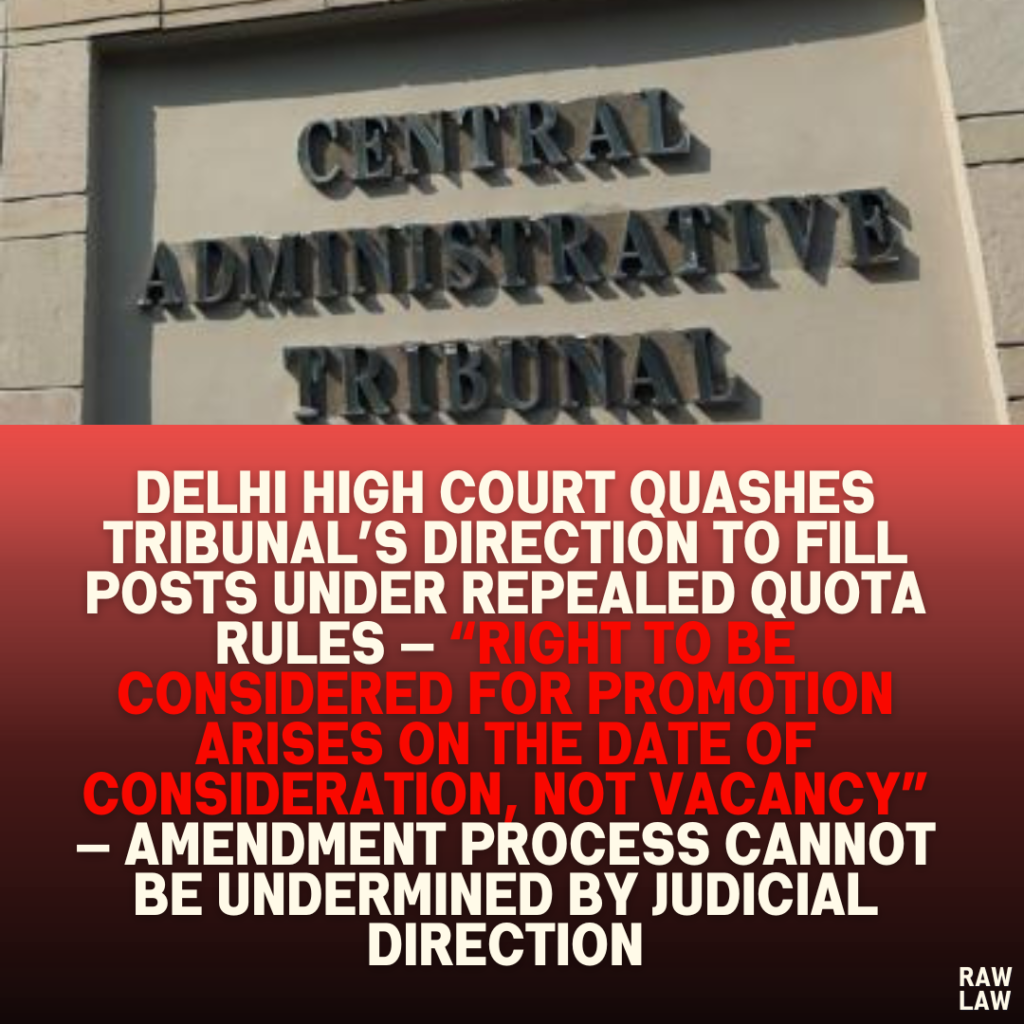Court’s Decision
The Delhi High Court allowed the writ petition filed by the Government of NCT of Delhi and quashed the order dated 16.12.2022 passed by the Central Administrative Tribunal. The Tribunal’s direction to convene the Departmental Promotion Committee (DPC) and consider eligible candidates under the 20% accelerated promotion quota was set aside. The Court held that:
“The only direction that the learned Tribunal could have passed was to direct the petitioners to expedite this process [of amending the Recruitment Rules], rather than to consider the respondent Nos.1 to 5 for appointment to the said posts.”
Facts
- The Central Administrative Tribunal had allowed the respondents’ application and directed the petitioners to convene a DPC and consider eligible candidates under the 20% promotion quota to the post of Leading Fireman.
- The impugned Tribunal order also directed that this be done expeditiously and preferably within 8 weeks.
- The petitioners challenged this order on the ground that Recruitment Rules (RRs) were under amendment at that time and were amended soon after the Tribunal’s order to remove the 20% quota.
- The petitioners had consciously decided not to fill these posts during the transition, citing complaints and legal issues regarding eligibility qualifications (Grade-I certification).
- In their counter-affidavit before the Tribunal, the petitioners had explained that amendments to remove the 20% quota were at the final stage and promotions would follow once legal issues were resolved.
Issues
- Whether the Tribunal was justified in directing filling of vacancies under the old Recruitment Rules, despite the amendment process being underway.
- Whether the respondents had a right to promotion under the pre-amendment quota scheme.
Petitioner’s Arguments
- The direction to fill vacancies under the old RRs was erroneous since the amendment process was nearly complete.
- The Supreme Court’s decision in State of Himachal Pradesh v. Rajkumar & Ors. was relied on to argue that no vested right exists to seek promotion under repealed rules.
- Promotions are governed by rules “in force” at the time of consideration, not when the vacancies arose.
- The decision not to fill the posts under the old rules was a conscious policy decision.
Respondent’s Arguments
- Vacancies existing at the time ought to have been filled as per the rules then prevailing.
- The Tribunal rightly directed that promotions should be conducted under the rules applicable at the time the vacancies arose.
- Promotions cannot be denied merely because a change in rules was anticipated.
Analysis of the Law
- The Court reaffirmed that “no person has a right to promotion, but only a right to be considered for promotion.”
- It acknowledged the well-settled legal position that filling up of posts is within the prerogative of the authority and must align with service exigency.
- The Court stressed that once a conscious policy decision is made not to fill certain posts due to pending rule amendments, tribunals or courts should not interfere by directing promotions under the old regime.
Precedent Analysis
The Court relied heavily on the Supreme Court’s decision in State of Himachal Pradesh v. Rajkumar & Ors. [(2023) 3 SCC 773], which clarified that:
- “There is no rule of universal application that vacancies must be necessarily filled on the basis of the law which existed on the date when they arose.”
- The right to be considered for promotion arises “on the date of consideration,” not on the date of vacancy.
- The government can take a conscious decision not to fill up pre-amendment vacancies, provided such decision is fair and reasonable.
- The principle in Rangaiah does not require posts to be filled immediately upon creation.
Court’s Reasoning
- The Court held that the Tribunal exceeded its jurisdiction by directing filling of posts under repealed rules, ignoring that the petitioners had already initiated and nearly completed the amendment process.
- The direction to convene a DPC for accelerated promotion under a quota that was about to be removed was not sustainable.
- The proper course would have been to expedite the amendment process, not to enforce outdated rules.
Conclusion
The High Court quashed the Tribunal’s order and allowed the writ petition. It reiterated that a government policy decision to amend rules and withhold appointments pending such amendment cannot be overridden unless shown to be arbitrary or violative of Article 14.
Implications
- This judgment reinforces that promotion policies and decisions must be judged based on the rules existing at the time of consideration.
- It affirms administrative discretion in withholding promotions while amending rules, so long as the action is reasonable and non-arbitrary.
- The ruling narrows the applicability of the Rangaiah principle and aligns with recent Supreme Court jurisprudence emphasizing flexibility in cadre management and restructuring.




Pingback: Supreme Court Acquits Two Men in 1981 Murder Case Due to Unreliable Witness Testimony and Procedural Lapses — "No Effort Was Made to Verify Thumb Impressions or Record Supplementary Statements of Witnesses" - Raw Law